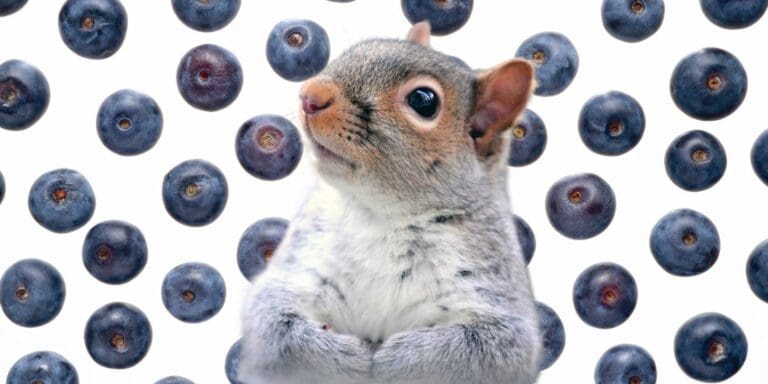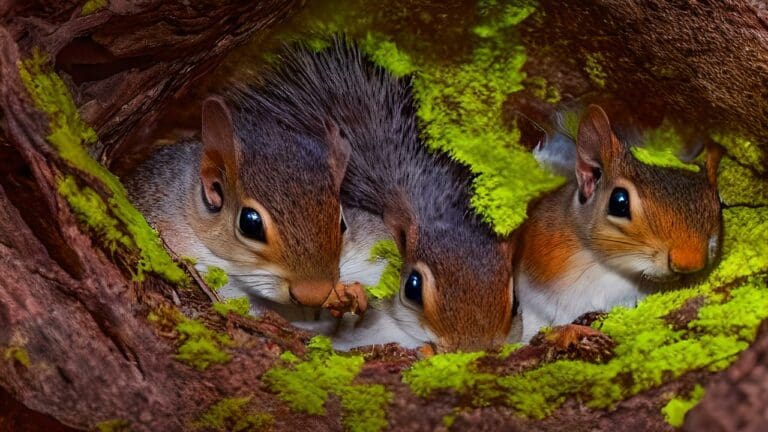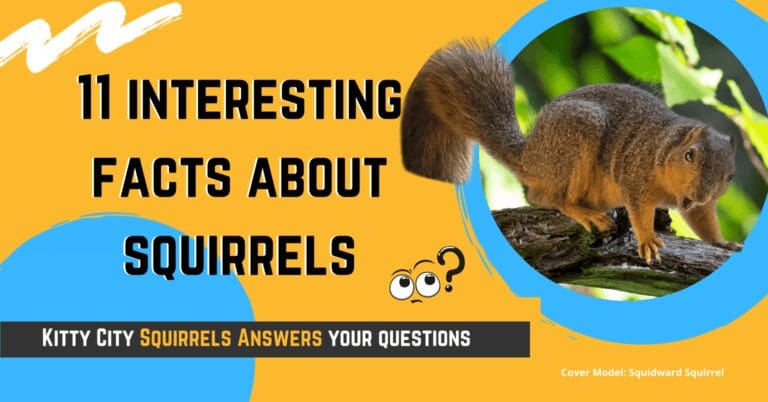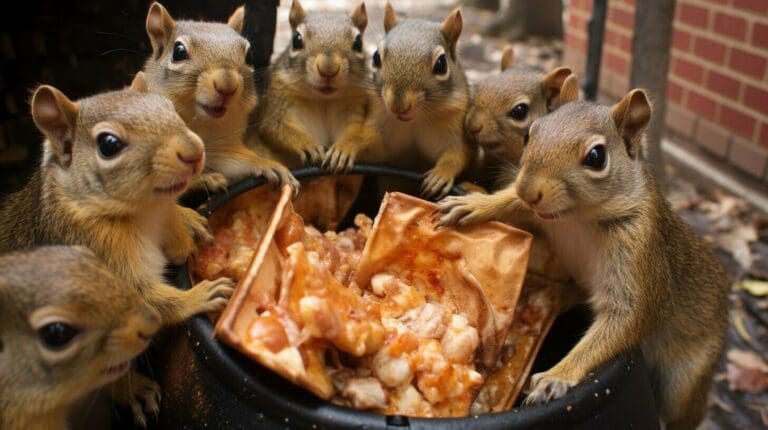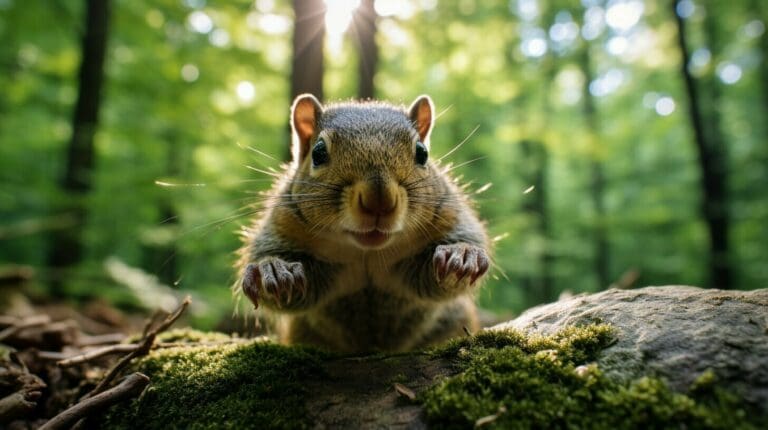Do Squirrels Eat Grapes? Diet Facts Unveiled.
Have you ever spied a squirrel in your backyard and wondered if squirrels eat grapes? These adorable creatures, known for their acrobatic antics, are quite the opportunistic feeders. Indeed, squirrels can eat grapes and even relish them as part of their omnivorous diet. Grapes offer a juicy treat with essential hydration and nutrients like vitamins C and K. However, when feeding grapes to squirrels, moderation is key. While grapes are safe for squirrels, they should not replace the animal’s primary diet but rather complement it as an occasional enrichment.
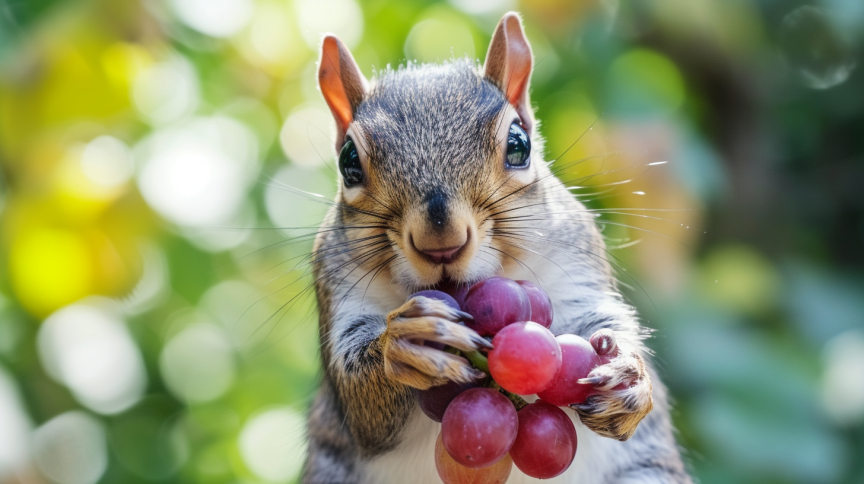
Do Squirrels Eat Grapes?
Yes, squirrels enjoy a varied diet that includes grapes. Grapes provide hydration and nutrition. For squirrels 12 weeks or younger, it’s advisable to peel the grapes to make them easier to eat with less risk of choking and easier to digest.
As you sit back and relish nature’s play, observing the relationship between squirrels and grapes is entertaining. Whether you’re a casual observer or an avid garden enthusiast, understanding the dietary needs of these furry friends is essential for their health and your garden’s well-being. Let’s dive deeper to satisfy more than just your curiosity!
Key Takeaways
- Squirrels find grapes palatable and benefit from the vitamins and hydration they provide.
- Grapes are to be given as part of a diversified diet to balance their natural food sources.
- Feeding practices should center on moderation to avoid health issues or garden invasions.
- While urban squirrels may have a varied diet, wild squirrels forage primarily from natural sources.
- Using organic, pesticide-free fruit is crucial for squirrel health and safety.
Understanding Squirrel Dietary Preferences
When observing the playful agility of squirrels, one might wonder what squirrels can eat besides nuts. The answer lies in their omnivorous diet, which is quite diverse. These energetic creatures are adept in foraging various foods beyond the usual acorns and seeds. Let’s delve into what types of food squirrels eat and how fruits like grapes fit into their feeding repertoire.

The Omnivorous Nature of Squirrels
Squirrels exhibit an impressive adaptability in their diet, consuming everything from seeds to tiny insects. They obtain the nutrients necessary for their health and energy levels through this variety. Despite being renowned for their love of nuts, a squirrel’s menu is surprisingly rich, featuring items you wouldn’t typically associate with these bushy-tailed foragers.
Fruits in A Squirrel’s Diet: Do They Have a Sweet Tooth?
Indeed, do squirrels eat fruit? The answer is a resounding yes. Squirrels have a propensity for sweet treats, and fruits provide them with a quick energy source. Grapes, mainly, are a favourite due to their juicy nature and ease of consumption. Feeding grapes to squirrels can be a delightful sight, but these snacks need to remain just that—snacks. So, do squirrels like grapes? They certainly do but in balance with other nutritional food sources.
Typical Foods in A Squirrel’s Diet Beyond Nuts and Seeds
Beyond their staple of nuts and seeds, squirrels indulge in a range of foods such as fruits, vegetables, and insects. These items provide them with a well-rounded intake of vitamins and minerals. This table gives a glimpse into the typical diet of a squirrel, showcasing their omnivorous nature:
| Food Category | Examples | Benefits to Squirrels |
|---|---|---|
| Nuts and Seeds | Acorns, Walnuts, Sunflower seeds | Essential fats and proteins |
| Fruits | Strawberries, Raisins, Grapes | Vitamins, hydration, natural sugars |
| Vegetables | Carrots, Squash, Broccoli | Fiber and minerals |
| Insects | Beetles, Caterpillars, Grubs | Protein and calcium |
While it’s intriguing to ponder over do wild squirrels eat grapes, it’s essential to recognize they’re part of a broader diet that sustains their active lifestyle. Squirrels’ ability to identify and consume diverse diets, including squirrels and grapes, reflects their evolutionary success in various habitats. Balanced nourishment from sources like grapes supports their profuse energy – a vital factor for their survival.
Do Squirrels Eat Grapes and Other Fruits?
If you’re asking, “Can squirrels eat grapes?” you’ll be pleased to know that these versatile mammals enjoy some fruity flavor. Not only do squirrels eat grapes, but they also savor the hydration and nutrients these succulent morsels provide. As omnivores, their diet casts a wide net, allowing them to delight in various fruits, like blueberries, alongside their conventional nut and seed consumption.
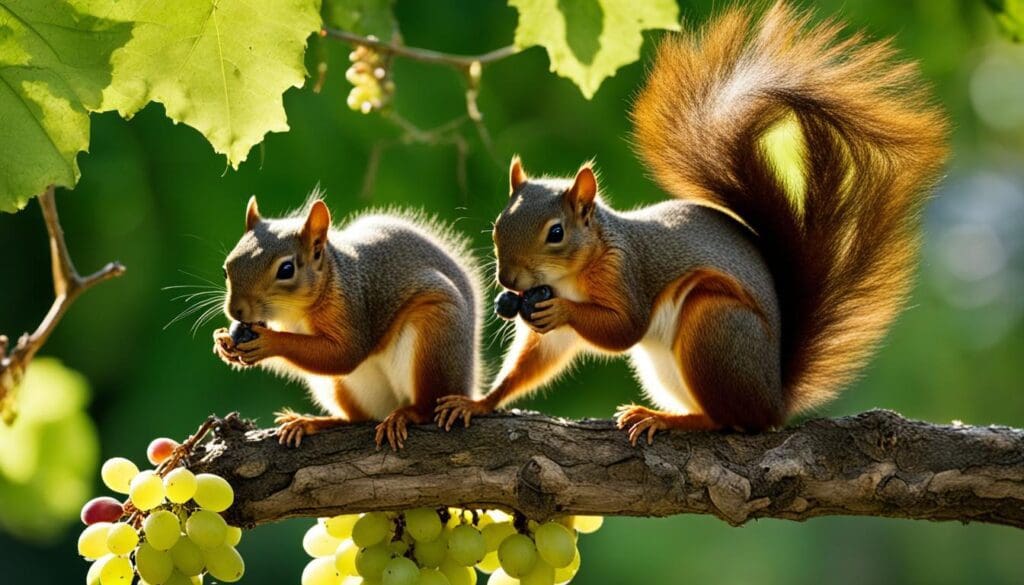
While you may witness these furry foragers feasting in your backyard, it’s essential to understand that while grapes are safe for squirrels and how these treats fit into their overall dietary regimen. Indeed, squirrels find both nourishment and pleasure in grapes, but their health remains optimal with a more comprehensive diet incorporating naturally occurring foods.
In the wild, you may ponder, “Do wild squirrels eat grapes?” Yes, they do, when available. However, their primary sustenance still derives from what nature provides — seeds, nuts, and the occasional insect. Urban squirrels have adapted to include more eclectic options like bird feeder contents and leftovers from human activities, but even then, moderation is key. Too much of any single food source, including grapes, can swing the nutritional balance unfavorably.
To ensure the well-being of these agile creatures, here are some safe feeding tips:
- Offer organic, pesticide-free grapes to prevent any potential health risks.
- Feed grapes in moderation as a part of their varied diet.
- Always thoroughly wash the fruit before giving it to the squirrels.
Understanding the dietary preferences of squirrels, especially about grapes and fruits, allows us to foster a harmonious relationship with these charming animals. It ensures that while they can enjoy the sweetness of grapes, they do so safely and healthily as part of a balanced diet appropriate for their species.
The Nutritional Benefits of Grapes for Squirrels
While many recognize the affinity squirrels have for nuts and seeds, you might be surprised at how beneficial a grape can be for these nimble foragers. Grapes don’t just tantalize their taste buds; they also provide a substantial source of vitamins, antioxidants, and hydration. This section explores the advantages of integrating grapes into a squirrel’s diet while highlighting the importance of feeding in moderation.
Vitamins and Hydration: Grapes as a Source of Nourishment
Grapes are not only a delicious snack for squirrels but are also replete with vitamins C and K and other minerals that contribute significantly to their overall health. Natural sugars provide a quick burst of energy, beneficial for sustaining their active lifestyle. As squirrels scamper through their day, the high water content in grapes is vital in keeping them hydrated, especially in warmer climates.
Subscribe to the Free VIP Squirrel Scoop Insider Magazine
Written by none other than Bart the Balcony Squirrel, this lighthearted take on life and current squirrel-related world events is sure to bring a smile to your face. From his perch on the Kitty City Squirrels balcony, Bart brings a unique and entertaining perspective to every issue. Why wait, Subscribe now!
Safe Feeding Practices: Moderation is Key
As with most dietary concerns, the idiom ‘too much of a good thing’ applies when feeding squirrels. While grapes are safe and healthy for these creatures, offering them as an occasional treat rather than the mainstay of their diet is crucial. Ensuring a variety of food sources mimics their natural eating habits reduces the risk of dietary imbalances and promotes better health outcomes.
Comparison With Other Fruit Options for Squirrels
Squirrels enjoy a myriad of fruits, each offering unique benefits and flavors. Below is a comparative table highlighting various fruits and their respective values to a squirrel’s diet. Compare these to understand why grapes might be a great treat but should be part of a larger, varied diet.
| Fruit | Key Nutrients | Comments |
|---|---|---|
| Grapes | Vitamins C and K, hydration | Excellent for hydration and quick energy. |
| Apples | Fiber, vitamins A and C | Good for digestive health and immune support. |
| Bananas | Potassium, vitamin B6 | Great for muscle function and metabolism. |
| Strawberries | Vitamin C, manganese, antioxidants | Boosts immune health and provides anti-inflammatory benefits. |
As you can see, grapes hold their own against other fruits regarding nutritional value for squirrels. However, they’re part of a spectrum of fruits that can contribute to a balanced diet for these energetic critters.
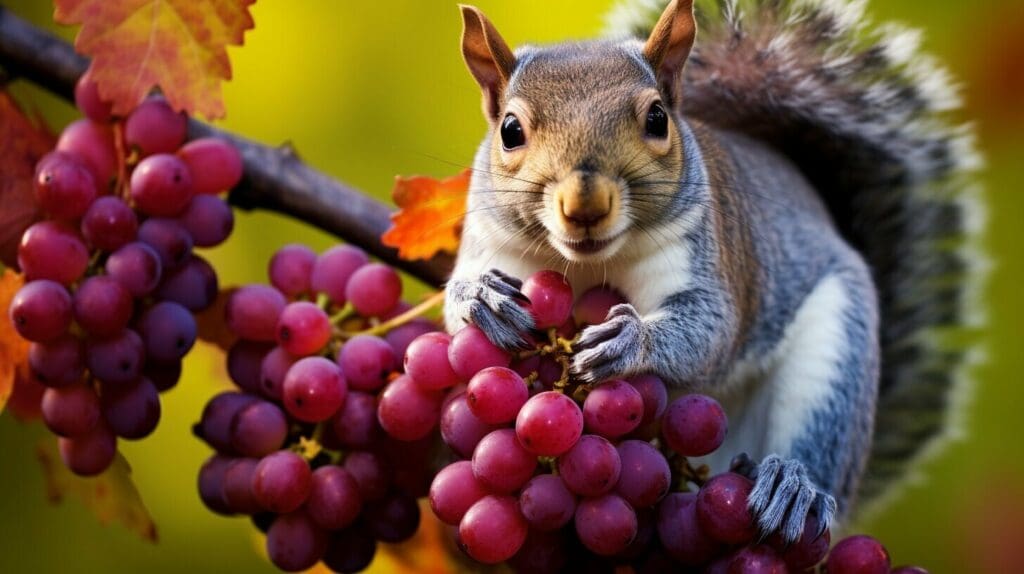
Conclusion
Throughout this exploration into the eating habits of squirrels, we’ve discovered that these sprightly creatures enjoy grapes, benefiting from their hydration and nutritional content. The image of a squirrel perched on a branch nibbling on a juicy grape warms the heart. And reinforces the importance of diversifying their diet to ensure a healthy balance.
It’s clear that while grapes and other fruits are great for squirrels, they should be considered treats and not staple diet components. You now know moderation and variety are key to feeding these little foragers.
FAQ
Do squirrels eat grapes?
Yes, squirrels do eat grapes. They are often attracted to the sweetness of the fruit and it can be a part of their diet.
Can squirrels safely eat grapes?
Grapes are generally safe for squirrels to eat in moderation. However, just like any other treat, they should not form the bulk of a squirrel’s diet to prevent nutritional imbalances.
Are there any benefits to feeding squirrels grapes?
Grapes can provide squirrels with essential vitamins, such as Vitamin C and K, and are a good source of hydration. Nonetheless, they should be given as an occasional treat rather than a staple food.
What other types of food do squirrels eat besides nuts?
Squirrels have a diverse diet that includes seeds, fruits like grapes, vegetables, insects, and occasionally small animals like bird eggs. They are adaptable foragers that consume a variety of food items available in their environment.
Should wild squirrels be fed grapes?
While wild squirrels can eat grapes, it is not necessary to feed them as they are adept at finding their own food. If you choose to feed grapes to wild squirrels, do so sparingly and ensure the grapes are clean and free of pesticides.
Do squirrels have a preference for fruit, and do they like grapes in particular?
Squirrels are known to enjoy various fruits due to their natural sweetness and grapes are no exception. They are attracted to the high energy content and hydration fruits can provide, making grapes a likable treat.
What is the proper way to feed grapes to squirrels?
When feeding grapes to squirrels, offer them in small quantities as part of a varied diet. Ensure the grapes are organic, pesticide-free, and thoroughly washed to avoid exposing squirrels to harmful substances.
How do the diets of urban squirrels differ from those of wild squirrels?
Urban squirrels may have more access to human-provided foods, such as from bird feeders or leftovers, while wild squirrels primarily rely on natural food sources. However, both types of squirrels benefit from a diet that includes a variety of foods naturally found in their habitat.
Can feeding squirrels grapes lead to nutritional imbalances?
Yes, overfeeding grapes or any single type of food can lead to nutritional imbalances in squirrels. A balanced diet, closely mimicking what they would find in nature, is crucial for their health.
What fruits can squirrels eat besides grapes?
Squirrels can eat a range of fruits, such as strawberries, bananas, apples, cherries, and blueberries. Variety is key for a healthy diet, so it’s beneficial to provide different types of fruits in moderation and in small amounts.

